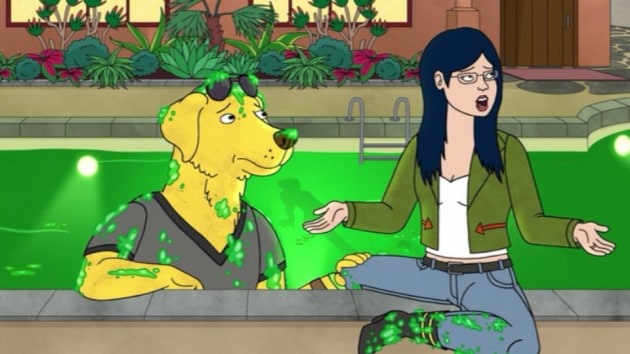
Connected together only by Tony Curtis and Prarie Home Companion, the three diverging stories emerging from Diane’s surprise party in “After the Party” seem remarkably different. However, it’s really the presentation of these three narratives that individualize them; strip away the various personalities of characters, and “After the Party” becomes quite a unified, touching episode of BoJack Horseman, one that explores the existential reflections that often go hand in hand with an adult on their birthday (or the birthday of a close friend).
The conflicts of “After the Party” all stem from an argument Diane and Mr. Peanutbutter have over Tony Curtis at the birthday party she didn’t ask for; it’s no surprise all three stories pick up after that particular argument is over, when everybody is leaving the party and the realities of their own lives begin to sink in. Often, important realizations in life don’t actually come from moments in our own lives: it’s seeing how others live that spring emotions from our subconscious, contemplating life experiences and moments from a third-person perspective. Watching Diane and Mr. Peanutbutter fight at Diane’s 35th birthday party are important moments for Carolyn and BoJack, whom the episode follow in separate vignettes before returning to Mr. Peanutbutter’s mansion for the final act.
Ostensibly, these stories are quite different: Carolyn breaking up with Vincent takes the tone of a studio sitcom acting out a farce, while BoJack’s foray into the woods and Diane’s conversation in the Jell-O pool with her husband. But they’re all about the same thing: the human search for emotional utopia, that place where we feel we’ve achieved everything, are still working towards something better, and are completely content with everything at a place in our lives. It’s something we all chase, whether we admit it or not: and time and time again, BoJack has pointed out how miserable that constant reflection and examination of self makes people (and in Hollywoo, the constant public scrutiny only amplifies this constant self deprecation). We’re always going to be dissatisfied with some things in life; but when does that balance shift, and we become truly unhappy?
“After the Party” is a rather fascinating examination of this, even though it’s not a particularly funny episode: beginning with Carolyn, “Party” lays out just how damaging this introverted perspective can be. From the first episode, Carolyn’s desperation has defined her: she’ll overlook anything in her pursuit of happiness, including her professional morals and the fact she’s clearly dating a child in a really big jacket. In “Party,’ seeing Diane’s dissatisfaction with life consume her became a catalyst for change; she rids herself of a dependent relationship, and realizes that maybe she should temper her expectations in life a bit – which is presented both as a white flag of defeat, and a somber moment of maturity: “I think wanting to believe something doesn’t mean that something is real, grounding the goofy farce of Vincent trying to keep his silly game afloat.
(Plus, her story has Todd uncomfortably helping two phones make out in a lovely little Her parody – who couldn’t enjoy that?).
Moving to BoJack, “After the Party” is already driving a wedge between BoJack and his new girlfriend Wanda, who accidentally started the fight because she can’t figure out who has died in the last 30 years (like most of her family). Unfortunately, their story gets the short straw here, attaching itself to the idea of BoJack’s constant dissatisfaction, rather then spending the time to build out their relationship a little more. Their dynamic’s barely been established, and already BoJack is expressing regret, staring at Charlotte’s business card while they wait for a deer in the emergency room (that BoJack ran over on the way home); I like Wanda’s sentiment that “some things take time,” but the segments around “After the Party” seem to suggest a much darker interpretation of that moment than is intended. In the context of the episode, it feels like her last line alludes more to BoJack’s inherent need to destroy things in his life than the potential of their relationship, which briefly unanchors the pathos of the episode.
Thankfully, “After the Party” returns to the titular scene before it can linger on Wanda’s terrible jokes for too long, and as expected, this is where the episode really comes to life. Diane and Mr. Peanutbutter have to come to terms with their differences as a couple, philosophic valleys they need to cross to maintain their relationship. They both have to realize that they’re “wired differently”: Peanutbutter’s age and loyalist ways make him want to revolve his entire life around Diane, the beacon of joy in his life. Diane, with her trip to Cordovia and desire to help the world (or so she says), isn’t like that: she still wants to continue evolving, and let life be her priority, not the people surrounding her in it.
Those are two very different approaches to the world, both informed by Diane and Mr. Peanutbutter both realizing their position on the time line of life; they’re searching for meaning in their life, and clinging onto any attempt at defining themselves in a meaningful way. Can a couple work if those definitions don’t align, where people are so diametrically opposed? Unlike most media – or like most of real life – “After the Party” offers us a bit of hope (or at least, momentary delusion) that it can: the episode ends with Diane and Mr. Peanutbutter’s relationship stronger than ever, while the other two depicted in the same half hour have frayed in serious ways, even though all three derived from the same conflict. It’s a perfect example of how BoJack is able to take its nonsensical satire of Hollywood and use it as an access point for much deeper, personal stories. Add to that the show’s grasp of nuance and balance between comedy and drama, and it’s no surprise how quickly it’s become one of the more emotionally evocative shows in recent memory.
[Photo via Netflix]
 Follow Us
Follow Us





